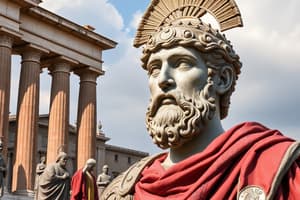Podcast
Questions and Answers
What significant title did Augustus receive in 2 BC that emphasized his leadership role?
What significant title did Augustus receive in 2 BC that emphasized his leadership role?
- Imperator
- Pater Patriae (correct)
- Princeps Senatus
- Pontifex Maximus
What power did the tribunicia potestas grant Augustus?
What power did the tribunicia potestas grant Augustus?
- Supreme military command
- Control over finances
- Veto power on legislation (correct)
- Judicial authority
In what role did Augustus promote himself among his peers in the Senate?
In what role did Augustus promote himself among his peers in the Senate?
- Consul
- Princeps Senatus (correct)
- Senator Elect
- Tribune of the Plebs
Which term describes the form of government Augustus created, leading to future emperors?
Which term describes the form of government Augustus created, leading to future emperors?
What was one of the challenges Augustus faced with his governance style as 'primus inter pares'?
What was one of the challenges Augustus faced with his governance style as 'primus inter pares'?
Flashcards
Tribunician Power (tribunicia potestas)
Tribunician Power (tribunicia potestas)
The right of veto on legislation and personal inviolability, granted to Augustus every year.
Pontifex Maximus
Pontifex Maximus
The supreme religious leader of Rome, a position held by Augustus since 12 BC.
Princeps Senatus
Princeps Senatus
The leader of the Roman Senate, a title held by Augustus, allowing him the power to speak first.
Primus Inter Pares
Primus Inter Pares
Signup and view all the flashcards
Autocratic Regime
Autocratic Regime
Signup and view all the flashcards
Study Notes
Augustan Principate
- Augustus obtained annual tribunician power, gaining the traditional authority of tribunes of the plebe. This included legislative and personal power.
- Throughout his reign, he held these powers repeatedly, eventually becoming Pontifex Maximus, the highest priest.
- In 27 BCE, Augustus proclaimed the Roman Republic.
- Augustus asserted moral leadership and influence.
- He served as consul for 13 years.
- His rule lasted until 14 CE.
Augustan Rule
- Augustus's power was gradually consolidated, leading to an inevitable change in the political system.
- The new era brought both continuity and change. The respect for tradition was accompanied by a new political regime.
- The term princeps (first citizen) was used, indicating a position above equals, without absolute power. This differed markedly from the prior republican system.
- Augustus was recognized as the first Emperor, though the name itself marked a major shift from the Republic.
Studying That Suits You
Use AI to generate personalized quizzes and flashcards to suit your learning preferences.




